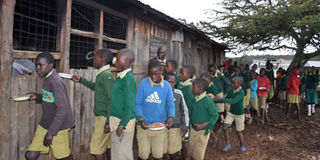Public day schools forced to scrap lunch programmes

Students take lunch at Chumvi Primary School in Laikipia East. PHOTO
What you need to know:
- Fred Matiang’i, the Cabinet Secretary for Education, Science and Technology, introduced new guidelines to cap fees in secondary schools leaving day scholars struggling under constrained budgets.
While the new fee guidelines were welcomed by the public, many parents did not see the food provision dilemma coming.
Already, students are being forced to carry food from home and parents have to dig into their pockets to give their children lunch money.
The hardest hit are children from poor families.
Learning in most public secondary day schools across the country is at stake as most students could be studying on empty stomachs the whole day.
Public day schools were forced to scrap lunch programmes at the beginning of this year when Education Cabinet Secretary Fred Matiang’i introduced new guidelines to cap fees in secondary schools leaving day scholars struggling under constrained budgets.
While the new fee guidelines were welcomed by the public, many parents did not see the food provision dilemma coming.
Already, students are being forced to carry food from home and parents have to dig into their pockets to give their children lunch money. The hardest hit are children from poor families.
“Fee reduction was a huge reprieve for us but it never occurred to me that it will affect the school feeding programme. My children are used to going to school without breakfast because they get that in school in addition to lunch. We don’t know what to do now as parents,” lamented Ms Anne Odhiambo, a mother of two secondary school students in Kisumu County.
Students in day public secondary schools are expected to pay Sh9,374 and those in boarding institutions part with Sh53,553 while the government pays Sh12,860 for every learner.
Day scholars who spoke to the Nation expressed their frustrations they have to spend the whole day in school hungry which is affecting their concentration in class. Parents also fear that the new turn of events could jeopardise quality of learning besides becoming a cause of public health concerns since students could be buying food from street hawkers.
MANY COUNTIES
Mr Nicholas Maiyo, National Parents Association chairman, said it was unfortunate that some students could be staying in school without food. He said the issue cuts across many counties.
“As parents, we are very concerned about this and we want our children fed in schools. Allowing students to roam outside the school looking for lunch will not only compromise the quality of learning but also result into drug and substance abuse among students,” Mr Maiyo told the Nation.
A high school teacher from Siaya County complained about the loss of time and disruption of learning in school due to the lunch hitch
“Last week our students went back home for lunch because we couldn’t offer them food. From 1pm, they came back at 3pm. A good number actually did not come back since their homes are far from school,” said the teacher adding that for students from poor families, the lunch provided in school was the only guaranteed meal they had for the day.
Allan Ojwang, a Form Two student at a secondary school in Homa Bay County, said he is forced to do menial jobs over the weekend so that he gets money to buy lunch in school.
“We are now looking at a private arrangement between parents and cooks in schools so that students can have meals in school at a moderate fee,” Mr Maiyo said.
Kenya Secondary Schools Heads Association chairman Kahi Indimuli called on the government to consider providing lunch for students in day schools to ease the burden on budgets.
POVERTY INDICES
Dr Philip Chebunet, a don at University of Eldoret, suggested that the capitation should equitably be distributed according to varying poverty indices. He said there was huge disparity among schools across the country and that allocating them the same amount of money resulted in a huge draw back for schools from poor regions.
Pressure continues to mount on the government to increase its capitation both on Free Primary Education and to secondary schools to boost learning.
Former Education Permanent Secretary, Prof James ole Kiyiapi, says the fact that the government only provides Sh1,420 and Sh12,860 for every learner in public primary and secondary school respectively is an indicator that the State is out of touch with reality since inflation and cost of learning materials had soared.
“Time and hard economic times have rendered this amount insignificant,” said Prof Kiyiapi.
The concerns about the school feeding programme have emerged amid an ongoing drought which has ravaged most parts of the country. Leaders have urged the government to introduce school feeding plans to help learners cope with the lack of food.
Eleven counties have been hit hard by the drought with Devolution Cabinet Secretary Mwangi Kiunjuri warning that the situation is bound to get worse.




